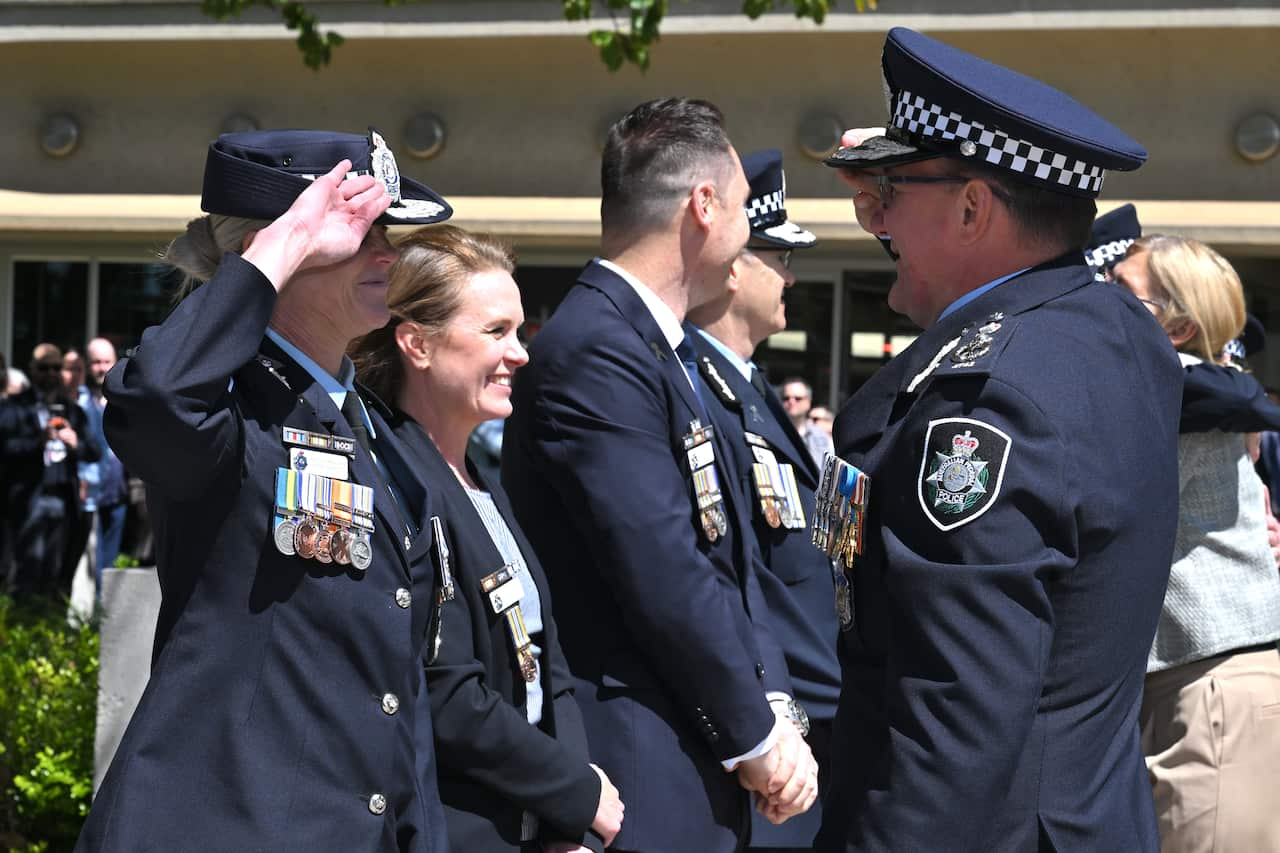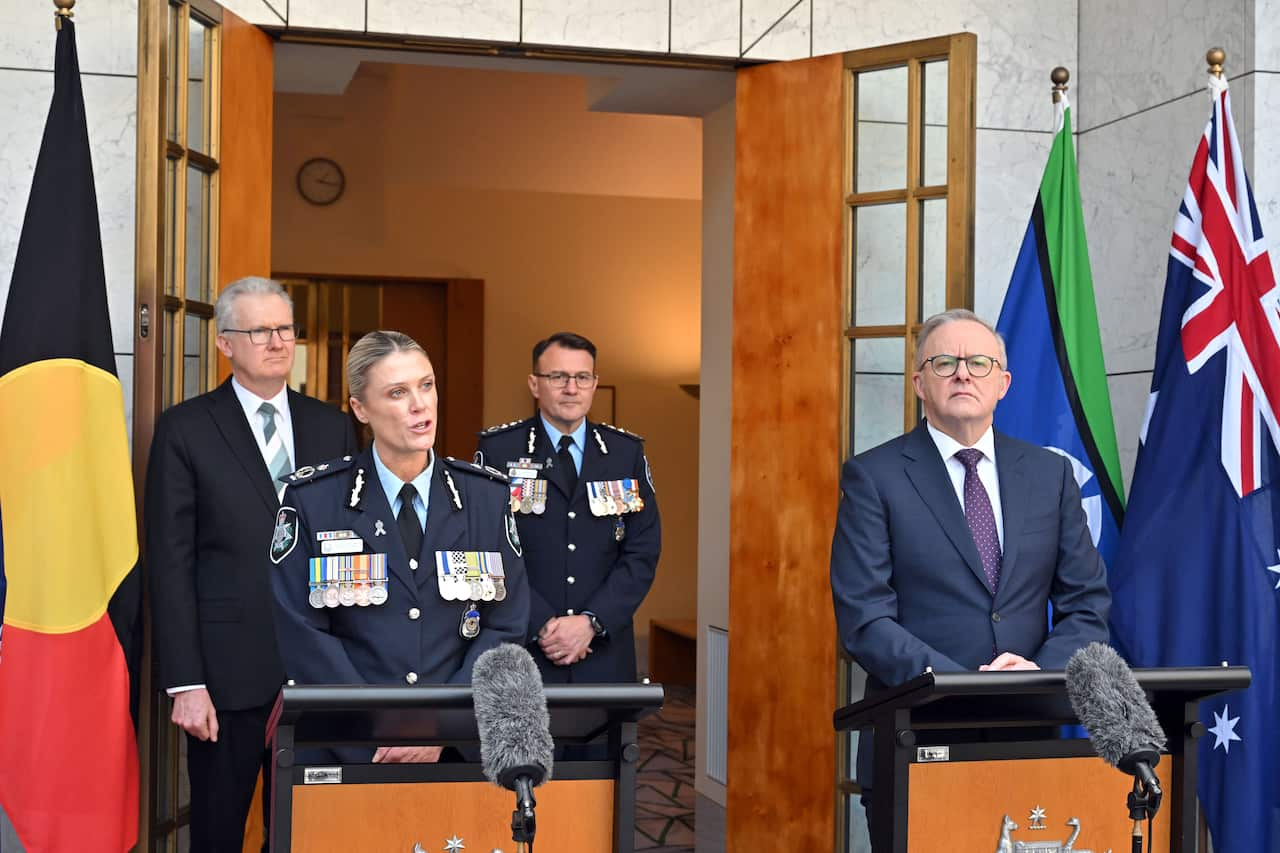Freshly sworn-in Australian Federal Police (AFP) commissioner Krissy Barrett has kicked off her tenure with a warning to individuals, groups or state actors who seek to strike fear within the community: "We will be taking action."
Barrett, who is the first woman ever to lead the AFP, told SBS her leadership will be characterised by a focus on social cohesion.
In her initial days as commissioner, Barrett has amended the agency's mission statement to include "defend" and protect Australia from domestic and global security threats.
"States are using criminal proxies to destabilise adversaries," she said.
"Put simply, most of our work now and into the future will be to deter, disrupt and respond to ... active threats, whether overt or in the shadows. That means we are defending."

Barrett has a clear warning to chaos agents seeking to disrupt Australian democracy.
"To individuals and groups out there looking to tear at our social fabric by causing hatred or fear within the community … they are on notice. We will be taking action."
"Under my leadership, the AFP will have a laser focus on disrupting crimes that impact our sovereignty, our democracy, our social cohesion, our financial systems, our future prosperity."
'Overlap' between states and organised crime
Barrett's first order of business as AFP commissioner has been to establish national security investigations teams across the nation with access to Five Eyes intelligence.
Australia, the United States, the United Kingdom, Canada and New Zealand are part of the Five Eyes alliance — which shares espionage, human, cyber and defence intelligence.
"Having access [to that intelligence] is a huge asset in our arsenal," Barrett said.
"There are scenarios where the AFP may not have the ability to take a particular action, but our partners overseas may."
According to Barrett, this is crucial in the fight against state-sponsored disruption.
"We have seen a shift in the environment," Barrett said.
"Where you would traditionally see organised crime keeping to organised crime, you would see state actors using more traditional methods to impact sovereignty in our country. We're now seeing an overlap."
"We are seeing tasking and payment [for attacks] being transferred to organised crime networks to use the systems and the networks they already have set up in this country."
Barrett has vowed to use the AFP's "international network" to target a known organised crime figure linked to illegal tobacco, who is a "person of interest" in the Adass Israel Synagogue firebombing.
"He is a national security threat to our country," she said in a statement to AFP staff on Tuesday.
"That means the AFP is targeting him — and his associated criminals and illicit tobacco enterprise."
The federal government and the Australian Security Intelligence Organisation (ASIO) have pointed blame at Iran for the firebombing, saying it was one of two antisemitic attacks directed by a branch of its military — the Islamic Revolutionary Guard Corps.
Iran's ambassador to Australia was expelled in August, and on Tuesday, the government announced it would amend terrorism laws to allow the listing of foreign state entities as "state sponsors of terrorism" in direct response to the IRGC's attacks.
Wars in Gaza, Ukraine causing uptick in violence
In February, during his annual threat assessment, ASIO boss Mike Burgess linked an uptick in antisemitism with Hamas' October 7 attack on Israel and the subsequent war in Gaza.
Burgess said the "normalisation of violent protest and intimidating behaviour" because of the two-year war in Gaza had lowered the threshold for "provocative and potentially violent acts" against Jewish Australians.

Barrett said such events have led to a rise in politically motivated violence — with threats against politicians doubling.
"We are seeing groups and individuals who are looking to cause high harm to our social cohesion and are looking to espouse hatred ... because of race or religion," she said.
"They're looking to create fear within communities."
Australia's antisemitism and Islamophobia envoys have reported five-fold increases in discrimination and violence against Jewish and Muslim communities respectively since the 2023 attack on Israel.
In August, thousands of Australians participated in anti-migration protests on the streets of Sydney and Melbourne, including neo-Nazi groups.
"Events overseas, in the Middle East, in Russia, Ukraine, even in the US, that does reverberate here in Australia," Barrett said.
"And I think we've all seen that playing out literally on our streets."
'Confident' AFP equipped to tackle youth radicalisation
The AFP commissioner has welcomed the parliament's introduction of social media bans for under-16s to curb the rise of youth radicalisation.
"That will help … the internet is a really vast space for us to police," Barrett said.
In recent times, the AFP's caseload has shifted from mainly religiously motivated extremism to politically motivated extremism.
But its record on deradicalising youth is far from perfect.
In 2023, a Victorian court found undercover AFP officers "thwarted efforts" to deradicalise a 13-year-old boy with autism and "fed his fixation" on the so-called Islamic State, after his parents went to Victoria Police seeking help.
Barrett said she "has confidence" in the integrity of AFP officers when engaging with vulnerable youth.
"Our investigators are balancing risk — heavy risk — every single day on behalf of this country," she said.
"The risks are real. We have seen young people who do have the intent, and they do have the capability to undertake acts of violent extremism, terrorism."
She said parents should remain confident in the AFP.
"The strong message is: have an understanding of what your child is doing. If there are changes in behaviour, or you have concerns, then you can, you should, reach out to us," she said.
For the latest from SBS News, download our app and subscribe to our newsletter.

